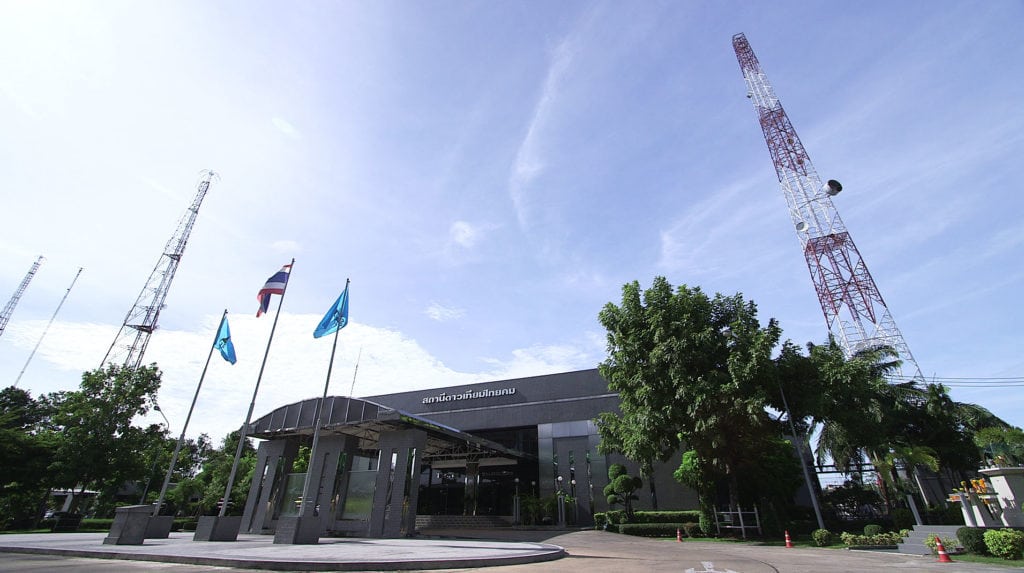Latest News

Thaicom headquarters. Photo: Thaicom.
Thaicom is facing an uphill struggle in 2017 in its satellite business as it looks to rebound from a difficult 2016 where it saw falls in overall profits and revenues. The operator, one of Asia’s largest, announced its full year results Feb. 2, revealing that revenues from its conventional satellite business for 2016 were 4.4 billion baht ($125.24 million), a fall of 617 million baht ($17.56 million) or 12.3 percent compared to 2015.
Thaicom said the drop was mainly due to an overall transponder utilization rate decrease — as one of its main Thai customers ceased to operate its business — together with revenue drop from retail customers following economic recession. This led to a drop of revenue from value-added services.
In its broadband business, revenue from the Thaicom 4 broadband satellite business was 4 billion baht ($113.86 million) for 2016, down by more than 5 percent compared to 2015.
A number of locally based analysts’ produced research reports based on the company’s financial results.
“Conventional satellite revenue [has] decreased, dragged down by the negative impact from the exit of satellite pay-TV operators such as GMMB and CTH, which had leased 10 transponders from Thaicom 5 and 6, representing 14 percent of its total transponder utilization. However, Thaicom had already obtained a new customer, Forever Group (a major satellite TV player in Myanmar), to take over the five transponders formerly leased by GMMB from Nov. 16 onwards. Moreover, Thaicom is confident that transponder demand in Thailand and Indochina remains strong, and expects to sign new contracts with new customers soon,” said Chaiwat Arsirawichai, a satellite equity analyst at UOB Kay Hian Securities, in a research note.
Chatchawin Lertapiruk, a satellite equity analyst at Thanachart Securities echoes this sentiment. “We still foresee some additional demand for Thaicom’s satellites but it doesn’t offset the overall drop in utilization (we estimate 65 percent in 2016F and 67 percent in 2017F vs. 76 percent in 2014 and 82 percent in 2015 for conventional satellites). Forever Group … has rented an additional five transponders this year. We expect potential demand upside from digital TV channels, if some of them convert more channels to HD, and this could potentially require two to three more transponders,” he said in a research note.
It was not just in the broadcast business where the operator found it tough in 2016. Arsirawichai also pointed to the operator’s Ipstar satellite revenue declining 10.5 percent quarter over quarter to 864 million baht ($24.59 million) in the fourth quarter of 2016. “This was mainly due to lower demand in Australia following the decrease of bandwidth usage from the National Broadband Network (NBN) contract. Service price was also adjusted to reflect market prices for some customers according to new contracts. These offset the increase in service revenue on the back of increasing bandwidth usage in India and the Philippines,” he added.
Ornmongkol Tantitanatorn, a satellite equity analyst at Phillip Securities added in a research note, “For the whole of FY16, profit plummeted 24 percent year-on-year to Baht 1.6 billion ($45.54 million) as (i) revenue from satellite and related services, which contributed 73 percent of its total revenue plunged 9 percent year-over-year to 8.4 billion baht ($239.10 million) as a result of a drop in transponder utilization after one of its major broadcasting customers in Thailand ceased its business operation and a decrease in bandwidth usage from NBN in Australia, and (ii) costs of satellite and related services.”
Veeravat Virochpoka, a satellite equity analyst at Finansia Syrus Securities said in a research note, “We maintain our bearish view on Thaicom’s 2017 operating performance. To elaborate, we expect revenues to continue to fall after two key customers of its broadcast satellite discontinue their business for full-year. In addition, we predict NBN’s usage of its broadband satellite will continue to drop until the contract ends in September this year, while revenues from TOT will disappear in 2H17. Together, they should put pressure on gross margin, significantly narrowing it down due to absence of economies of scale because costs are mostly fixed.”
New Satellite
In terms new satellites, Arsirawichai says Thaicom has approached CAT (Thailand’s main telco) to set up a 70:30 joint venture to develop a broadband satellite (Thaicom 9), but that any tie-up will require the approval of the National Space Affairs Committee. “CAT will utilize 30 percent of the capacity to serve demand from state agencies. Based on the Ministry of the Digital Economy and Society’s analysis, current demand is 6.5 transponders and 2Gbps of capacity, which would rise to 14 transponders and 4 Gbps by 2021. This will be positive for Thaicom as such a partnership agreement will unlock the regulatory concern over Thaicom,” said Arsirawichai.
Virochpoka added, “If the Cabinet approves such plan, it will serve as positive sentiment and help unlock long-term business risk. However, the capacity from new satellites will be made mostly to replace that of old ones that are about to expire in 2021. What’s more, the satellite industry has passed its growth stage after consumer behavior has changed, while we are yet to see how the company can concretely replace it with a new one,” he said.
Get the latest Via Satellite news!
Subscribe Now